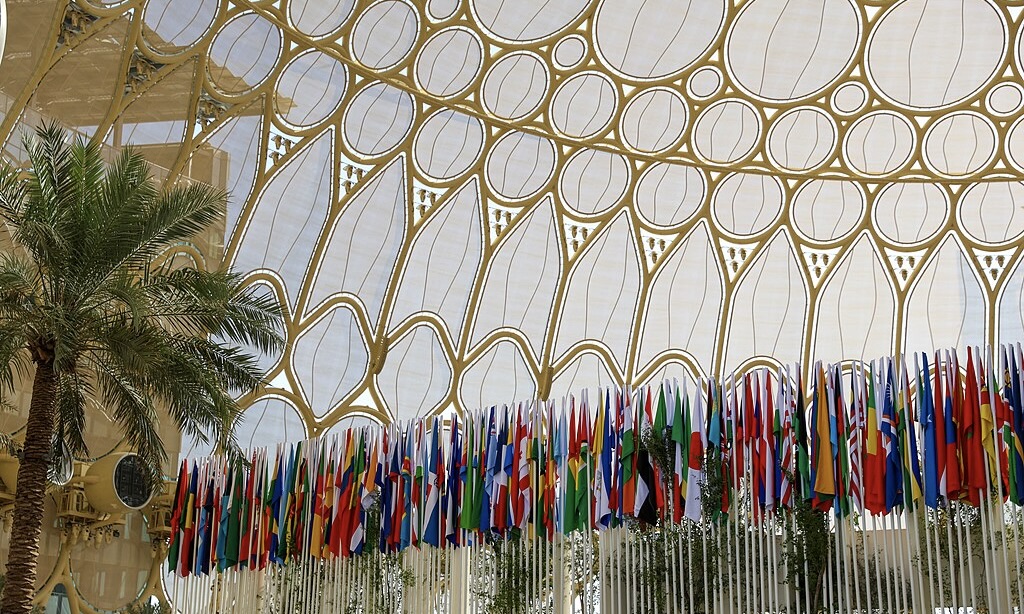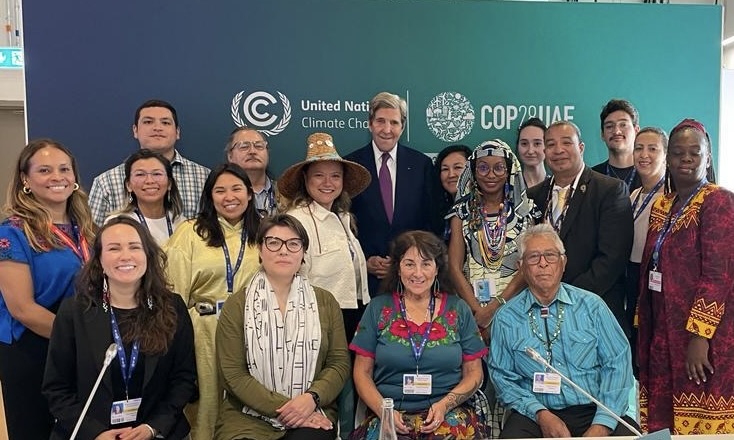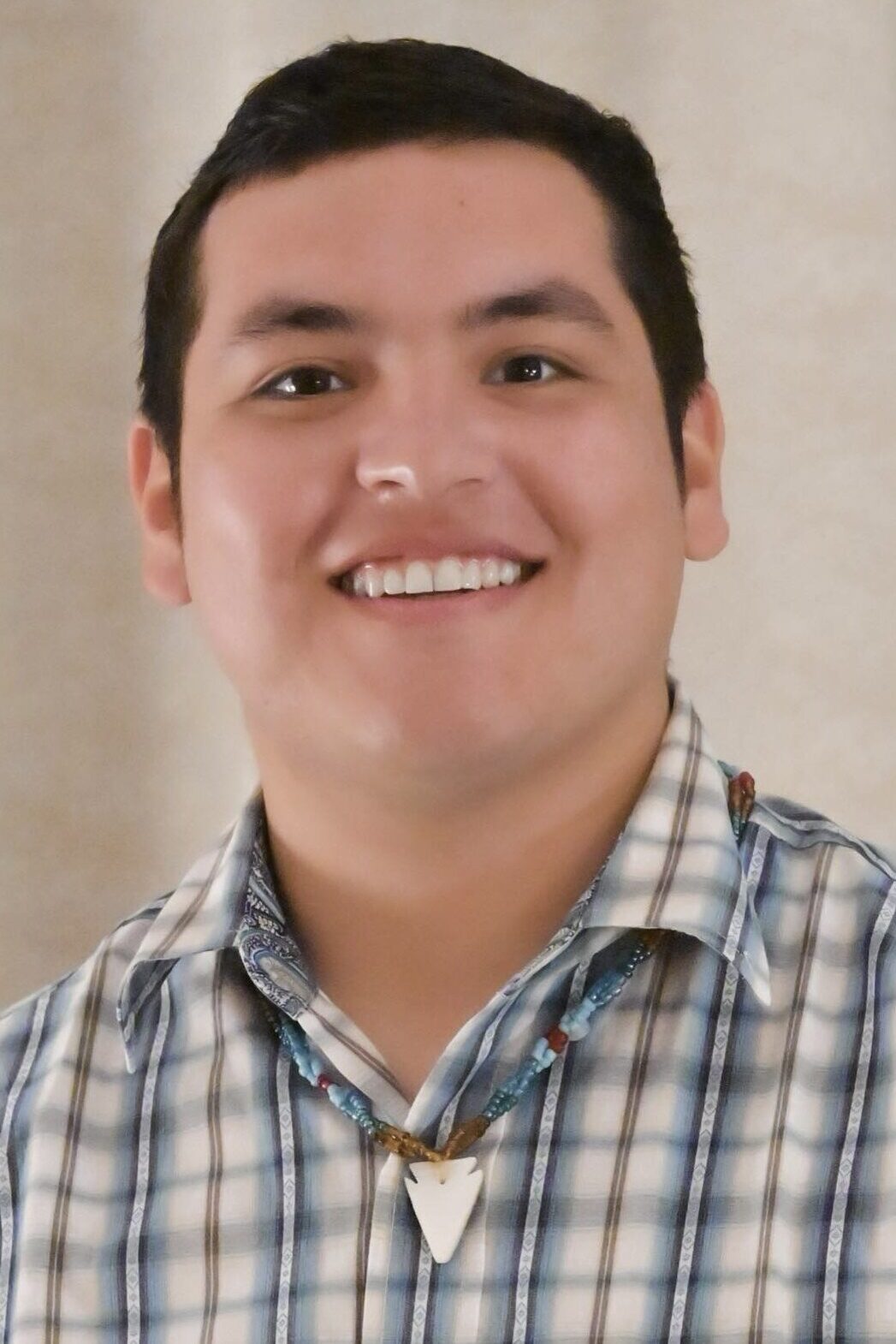For Indigenous peoples, the United Nations might be the belly of the colonial beast, but that’s where decisions affecting the future of Native nations are being made. “If we are not at the table, we are on the menu,” argues Victor Carmen Lopez, who attended the COP28 climate conference.
By Victor Carmen Lopez

Touching down in Dubai, I remembered the advice I was given the first time I attended a United Nations conference in 2015: “Spend time with the elders.”
For many Indigenous peoples, the UN symbolizes a colonial institution, or the “belly of the beast,” as my Auntie calls it. It’s a place where countries, many of them with policy records historically unfriendly to Indigenous peoples, gather to make decisions, in spaces that have long excluded Indigenous nations. And it’s true. It’s not an ideal system from our perspective.
But many people forget that Indigenous elders from across the world still decided it was important for us to be there, because we come from nations. I am sure they would rather be in their communities, with their people, living their best Indigenous lives. But colonialism and anti-Indigenous policy are real factors that impact our lives. So they still go to assert our nationhood, because if we are not at the table, we are on the menu.
Every year, whether it’s the UN Permanent Forum on Indigenous Issues or the UN Convention on Biological Diversity, you can find Indigenous elders, knowledge holders, chiefs, and even spiritual leaders advocating for our rights as nations at the UN. This year, walking the Disneyland-sized campus of the climate-focused COP28 in Dubai, was no exception. And per usual, I decided I would spend most of my time there shadowing and helping elders, asking them questions, and listening to their stories.
At COP28, I fortunately had three elder relatives attending through their own organizations. My auntie, Andrea Carmen, director of the International Indian Treaty Council, was accompanied by my uncles Angel Valencia (Yaqui) and Chief Garry Harrison (Chickaloon Village, Alaska). Each day, I spent time with at least one of them, asking them questions, listening to them, and deepening my understanding of everything they have been fighting for, just like I was advised to do nine years ago.
Supported by the Harvard FXB Center for Health & Human Rights and separately, the Climate and Health Foundation, which funded over 70 physicians and two medical students to attend, I spoke at various high-level COP28 panels on the intersection of Indigenous rights and knowledge in climate policy and health.
To give a tangible example, take Indigenous languages. Through learning from Indigenous elders of the Dakota Nation, personal immersion in learning my own Indigenous languages (Dakota and Yaqui), and collaboration with fellow Indigenous scholars, I have come to understand that Indigenous languages represent millennia of accumulated knowledge. Yet, centuries of colonization have weakened their vitality and survival. The weakening of Indigenous languages not only represents a loss of cultural identity but also a hit to Indigenous health and well-being.
But while there is a growing body of literature on the importance of Indigenous languages, the relationships between them and health on many levels is seldom discussed in climate spaces. At COP28, I sought to address this gap by emphasizing Indigenous languages as not only cultural keystones but also as forces shaping relationships between humans and the environment, relationships that contribute to environmental and planetary health.
Indeed, the loss of an Indigenous language negatively impacts the knowledge that Indigenous peoples have utilized to consistently maintain a sustainable relationship with the land for millennia, and this poses a risk to planetary health. As Dr. Nicole Redvers, an Indigenous planetary health expert writes: “It is therefore impossible to disaggregate individual, community, and planetary health within the Indigenous language learning process.” Sharing this knowledge in various panels were amazing opportunities to help educate physicians working on climate health about the intersections of their work and Indigenous language revitalization.

Beyond panel discussions, I actively engaged with country delegations such as Canada, Palestine, the US, and Bhutan as a member of the Indigenous Peoples Caucus at COP28, to integrate Indigenous health priorities into the broader climate policy priorities. A visit to Bhutan at the invitation of a friend right before the conference facilitated a meeting with their delegation. This was testament to a reality at COP: the only way to get facetime with member-states (countries party to the United Nations) was through personal connections. Most of the senior Indigenous negotiators had made plenty of these, but I was proud to contribute at least one. In a world where climate policies have real consequences on Indigenous health, every little effort helps and is important to the broader picture.
When it came to negotiations, I was specifically a member of the Indigenous Peoples Caucus Article 6 negotiation team. Article 6 is the section of the UN Climate Conference outcome document that deals with carbon-trading, a novel-mechanism to reduce carbon emissions in order to help mitigate global temperature rise. Essentially, it allows rich countries to help fund projects that reduce emissions, primarily in the Global South, and get carbon credits signifying they have offset some of their own carbon emissions.
The theory is that this system will keep the world carbon-neutral, or rather, emitting at a stable rate because it incentivizes high-income countries to invest in projects that reduce as much carbon emissions that they are producing, while helping low-income countries sustainably develop. On the surface, this sounds great. And some of these projects are great. For example, the REDD+ (Reducing Emissions from Deforestation and Forest Degradation) projects, which incentivize forest conservation and sustainable management practices, supported by carbon finance mechanisms like those described in Article 6. The problem that Indigenous peoples have is that the carbon trading mechanism outlined in Article 6 does not have Indigenous rights safeguards, which can turn a well-intentioned carbon-financed project into a human rights nightmare for Indigenous peoples.
For example, if the country of Kenya wanted to evict Ogiek pastoralist Indigenous communities from their lands to designate them as conservation zones, this would technically count as a project that would reduce carbon emissions, and a rich country like the US could help pay for it. And guess what? This actually happened. Under the guise of carbon-reducing projects and conservation, countries like Kenya are seizing Indigenous lands and waters, actions that human rights observers say are linked to carbon-trading.
At COP28, those of us with the Indigenous Peoples Caucus cited these examples and advocated that Article 6 and the carbon trading mechanism not be fully launched until the text contains clear Indigenous rights safeguards.
As an Indigenous health professional, I always integrated the fact that the connection to one’s traditional lands for an Indigenous person or community is vital to their health. And given 80% of the biodiversity left on planet earth is located in Indigenous managed lands, if Indigenous Peoples are removed from their territories, planetary health will suffer and hurt everyone. Partaking in COP28 alongside over 70 Caucus delegates from around the world, I am grateful for the crucial conversations at the intersection of climate and health. Our presence underscored the indispensable role of Indigenous peoples in shaping climate discourse, advocating for their rights, and fostering innovative approaches to address climate health challenges.

Victor A. Lopez-Carmen, an Indigenous health advocate and writer, is an enrolled member of the Crow Creek Sioux Tribe and also from the Yaqui Nation. In 2024, he will graduate with a MD from Harvard Medical School. As former co-chair of the UN Global Indigenous Youth Caucus, Victor helped lead Indigenous climate health advocacy work across various UN agencies, and co-edited Global Indigenous Youth: Through Their Eyes, a book sponsored by the UN and Columbia University.
Story published March 26, 2024
• • •
Enjoyed this story? Enter your email to receive notifications.
